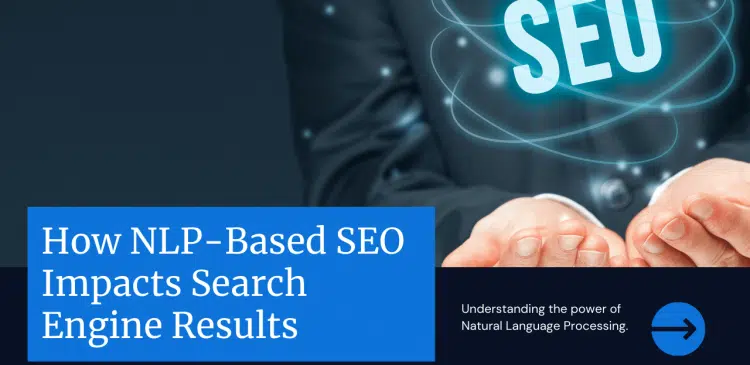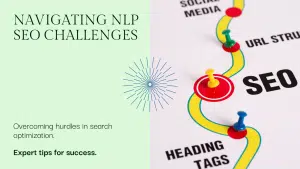Search Engine Results Affected By NLP-Based SEO

SEO has progressively improved over time to adapt to the new changes in the algorithms or functionality of the search engines and the users. In the recent past, Natural Language Processing (NLP) was introduced into SEO to enhance the internet ranking of websites by using analytic engines. Focusing on analyzing the influence of NLP-based SEO, this article investigates how search results are impacted.
Currently, with the help of innovative technologies, such as Google search, more complex NLP algorithms are being used to analyze search queries and web content.
Some key ways search engines use NLP include:
– Semantic Search: To interpret a question’s meaning and context to provide the relevant information, which goes beyond the literal meaning of the typed query.
– Entity Recognition: Recognizing persons, locations, companies, goods, services, etc., on web pages. This grasps content; it has a deeper meaning in a way that the previous definition does not.
– Sentiment Analysis: Identifying the tone and the attitudes towards the content to assess if it is relevant to the search query.
– Machine Translation: a blog about translation processes to ensure content is presented according to user languages and for the international market.
How NLP Impacts SEO
This simply means that the websites appear to have better search visibility if their content is optimized in a manner that complements the NLP understanding of the search engines.
Some key impacts include the following:
Evaluations based on this scenario have shown that semantic search queries have better rankings.
This is because using natural language and semantic keywords in the content, the pages become more searchable or more easily found within a search, depending on meaning and relevance. This results in enhanced rankings for the two searches based on semantic search queries.
Entity-Optimized Content
Linking the optimization work to key entities (persons, places, products, etc.) related to the business enhances how search engines evaluate the relevancy of results depending on the inquiries made.
Emotional Connection with Users
Content that is based on the tapping into the sentiments and emotions of the user makes the overall experience more fulfilling. It is also beneficial in terms of visibility since search engines also analyze sentiment.
Multilingual SEO
Since machine translation is used by search engines, supporting multiple languages in website translation, and using content translation for international audiences, enhances visibility in different languages.
NLP-Based Onsite Optimization
Nonetheless, actual content is not the only area where improvements can be made with the help of NLP. These techniques are also helpful for onsite SEO factors such as site architecture, internal linking structure, URL structure, etc. This enhances crawl-and-index opportunities.
Challenges with NLP SEO
NLP techniques for SEO also pose some challenges:
– Difficult to Scale: Creating large quantities of high-quality semantic content is not feasible by relying on automated methods alone; it requires human effort.
– Query Understanding Issues: Some queries might be interpreted by the search engine differently than intended, thus yielding unsatisfactory results.
– Higher Content Quality Needs: It is also important to note that natural language content requires more effort to be put into it and more planning compared to the keyword-content.
– Metrics Limitations: As for assessing semantic SEO effectiveness, it is essential to note that traditional SEO, such as ranking by keywords, has some flaws.
Key NLP-Based SEO Techniques
Some practical NLP techniques that SEOs can use include:
– Topic Modeling: This measures the similarity of the topics in a given set to identify clusters of concepts and topics for content optimization.
– Latent Semantic Indexing: Relating better-known and lesser-known terms that fall in the same classification.
– Knowledge Graph Optimization: This guarantees that all the essential objects associated with your business, such as founders, location, etc., are correctly recognized in the knowledge graph.
Conclusion
In conclusion, it can be stated that semantic SEO will also have a relatively positive future as the importance of semantic search is constantly growing.
It is relevant to note that with search engines improving their algorithms for NLP, the importance of semantic search lies in the future. Google also recently unveiled its Multitask Unified Model (MUM), which elevates search relevance even further by grounding language and information more deeply.
In conclusion, the use of semantic SEO solutions will increase in subsequent years. NLP has opened up a new dimension for SEO to get better search position as per meaning and intention of the search query.
In the future, web discovery will become much more contextual, which is a result of the evolution of search engines with AI/ML. Semantic SEO is thus an effective way for businesses to prepare for this future since it builds brand awareness and engages with users in a more relevant way. Although the approach is slightly more sophisticated, it is still about creating the best content by solving user problems.



 Bill Yeager, Co-Owner of High Point SEO & Marketing in CT
Bill Yeager, Co-Owner of High Point SEO & Marketing in CT